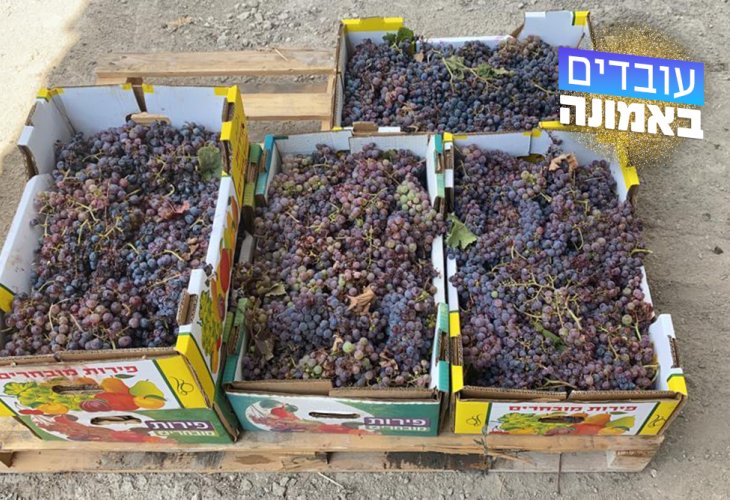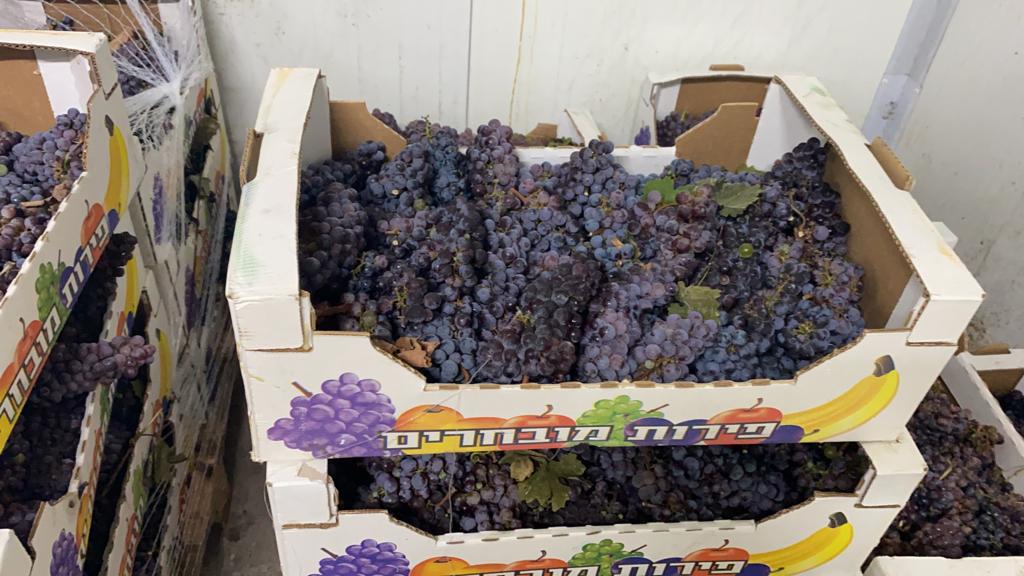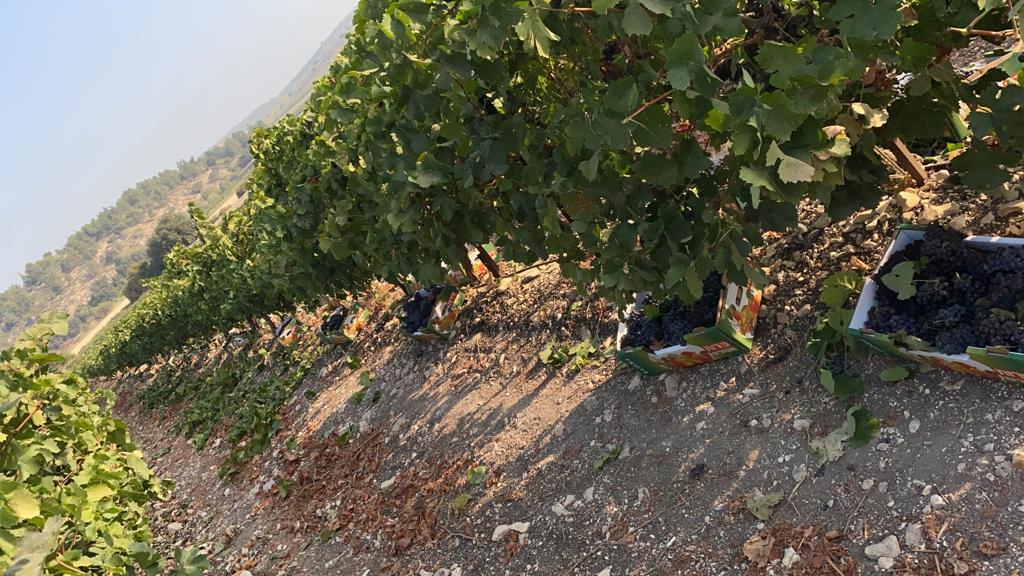What Led a Secular Farmer to Observe the Sabbatical Year? Eyal Goldiner Shares His Story
Eyal Goldiner does not define himself as religious, yet during the previous sabbatical year, he decided to observe it according to Jewish law. Today, he continues to do so and even persuades other farmers to follow suit. "I came to the conclusion that there is no other way," he asserts.

"It was a decision I made within moments—I didn't need to ask or consult anyone. I understood in the simplest way that I wanted to observe the sabbatical year, and since then, nothing could hold me back," says Eyal Goldiner, a farmer living in Moshav Amikam, near Zikhron Ya'akov.
Goldiner primarily grows wine grapes and some pomegranates in his fields. He has been involved in agriculture for 25 years, but this is the second time he gets to observe the sabbatical year. "And no, I'm not at all a religious person and don't define myself as such," he emphasizes at the outset.

"Decided to Manage on My Own"
So what led him to observe the sabbatical year? "It all started in the previous sabbatical year, about seven years ago," he shares. "At that time, I was on an agricultural project in Australia, because as part of my work I am involved in projects abroad. Whenever I have the opportunity to travel outside the country, I take into account that no work is done abroad on Shabbat and Sundays, so I take study material with me on the Torah portion and Mishnah to keep myself occupied."
Wait, but you said you're not a religious person...
"That's right, so what? I don't study Mishnah and the weekly Torah portion because of a religious connection, but because these are things that interest me. Especially the chapters dealing with entering the land. As someone who travels the country extensively and is very connected to its lands, I feel that I gain a lot of knowledge when I know what is written about it in the sources."
This trip took place after the sabbatical year had already begun, but for Goldiner, it was of no significance. "I knew it was the sabbatical year, and I also knew I didn't want to observe it because it was difficult and heavy for me, and I was incapable," he clarifies. But precisely during his time abroad, when he had the opportunity to peruse books, he found himself focusing on the laws of Shmita that appeared most relevant for that period. "I remember myself reading through the entire Shabbat, understanding the matter, and then on Sunday calling my wife and telling her: 'This year I'm observing the sabbatical year.'"

How did your wife react?
"She said to me: 'Gladly, but what does it mean?' I replied: 'I myself don't know, I just know that I want to observe the sabbatical year,' and that's how the conversation ended."
When Goldiner returned to the country, he didn't forget his decision, and one of the first things he did was meet with representatives from the Ministry of Agriculture to find out how to do it in practice. 'The ministry told me in response: 'You arrived too late; we have already closed the list of farmers supported by us during the sabbatical year.' Honestly, I didn't intend to seek support, and only then did I start to understand that whoever observes the sabbatical year can receive state assistance. So while no one was there to support me, I came to the conclusion that I could manage on my own, and if it really matters to me to observe the sabbatical year, then I will do it."
However, the next day, a surprise awaited him. "I was contacted by 'Keren Hashvi'it' who said: 'We heard you are observing the sabbatical year, and we understand you live in a non-religious settlement, so how did you come to this?' After I explained to them what led to my decision and shared my story, they promised to provide me with financial support as much as they could. Additionally, they gave me guidance on how to observe and what to do, because until then I didn't fully understand the significance."
The Trial of Heroes
Goldiner clarifies that observing the sabbatical year is not simple at all for farmers. "Even those who receive funding from the state or from Keren Hashvi'it still suffer, in theory, significant losses because even if their expenses are covered, they can't sell the produce, which means there are no revenues."
So what gave you the strength to continue resting, and even repeat it this year?
"As I mentioned, I enjoy delving into the verses and commentaries, and I simply came to the conclusion that this is a necessary fundamental step. After all, the land truly does not belong to us, and when I look around at the hills surrounding Zikhron Ya'akov, I see everything blooming, while in pictures from the 1950s, all these areas were as bare as a desert. It's not just that we humans planted; even all the natural vegetation on the mountains has renewed. It's something amazing, truly wondrous, not human handiwork at all. As someone who works in nature and sees it anew every day—I cannot remain complacent. It's clear to me that there is someone above who is responsible for everything, and if he asks me to abandon my field, that is what I will do.
"On a personal note, I'm also drawn to the fact that I'm among the few in the country who can achieve such a special mitzvah—after all, there are about 2,000 farmers in the entire country, and most do not observe the sabbatical year.

And how did the other farmers react when they heard you observe the sabbatical year?
"Initially, they were really surprised, it seemed to them that what I'm doing is completely illogical. But I've never listened to the reactions of those around me, and they also don't interest me. I do what seems right to me. Now, on the eve of this sabbatical year, I had the opportunity to talk to several farmers and try to enlist them in the important mitzvah. There are at least four farmers from the area who are observing the sabbatical year today because of me, and maybe more will follow."
And one cannot help but ask what your wife finally said, did she go along with the whole plan?
"When I returned to the country and informed her that I was going to observe the sabbatical year, she logically asked: 'But where will you get money every month?' I replied: 'I believe we will manage.' And indeed, that's what happened. I can't explain it, but I've succeeded in other fields I'm involved in, and I've taken on jobs I hadn't considered. I discovered that Hashem is the one running the world, and there is something very reassuring when you understand this. You know it's not up to you to decide. There is a higher power much greater than you."

